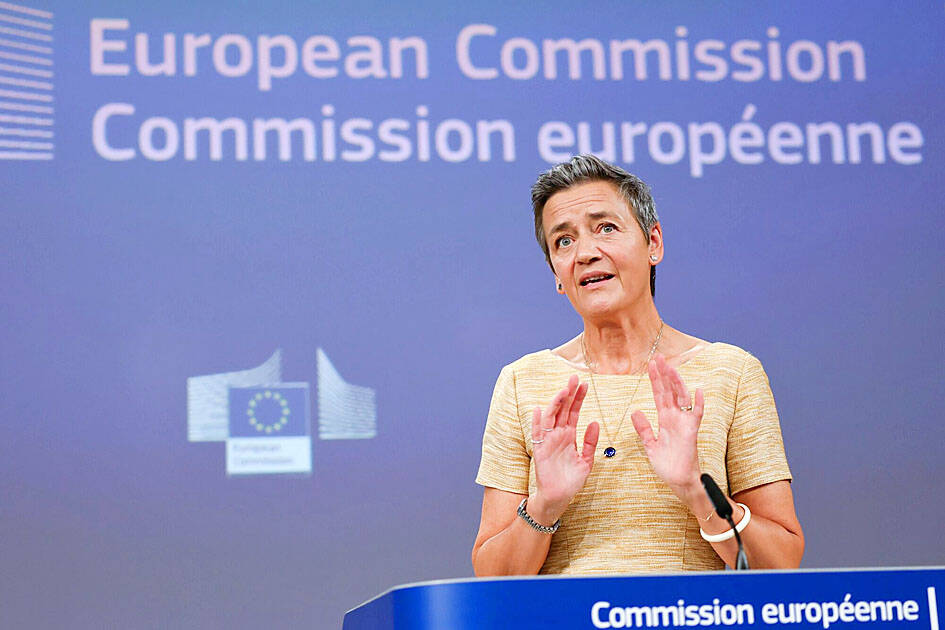Apple Inc yesterday lost its court fight over a 13 billion euros (US$14.4 billion) Irish tax bill and Google lost its challenge over a 2.4 billion euros fine for abusing its market power, in a double boost to the EU’s crackdown on Big Tech.
The EU’s Court of Justice in Luxembourg backed a landmark 2016 decision that Ireland broke state-aid law by giving Apple an unfair advantage.
In another victory for EU Commissioner for Competition Margrethe Vestager, the same court ruled on the same day that Google illegally leveraged its search-engine dominance to give a higher ranking to its own product listings.

Photo: Bloomberg
Vestager — who is just weeks away from departing the Brussels-based European Commission after two terms — made Apple and Alphabet Inc’s Google top targets after taking up her role in 2014.
The Apple decision was by far the biggest in her decade-long campaign for tax fairness, which has also targeted the likes of Amazon.com Inc and automaker Stellantis NV’s Fiat. Vestager has argued that selective tax benefits to big firms are illegal state aid that are banned in the EU.
“It’s important to show European taxpayers that once in a while, tax justice can be done,” Vestager told reporters in Brussels in response to questions on her Apple win.
Apple CEO Tim Cook previously blasted as “total political crap” the EU’s 2016 move to order the firm to pay 13 billion euros in back taxes, while the commission’s 2017 fine against Google was leveled for abusing its search dominance to give a higher ranking to its own product listings.
Vestager ordered Ireland to claw back the sum, which amounts to about two quarters of Mac sales globally. The money has been sitting in an escrow account pending a final ruling. Ireland must now decide what to do with its unwanted windfall.
“We are disappointed with today’s decision as previously the general court reviewed the facts and categorically annulled this case,” an Apple spokesperson said.
Separately, a Google spokesperson said that the company is “disappointed” with the court judgement on its appeal and that a 2017 offer to remedy the EU’s concerns helped to generate more clicks for other shopping services.
The EU’s focus on Google paved the way for global scrutiny, from the US to the UK. The EU has not merely targeted the firm’s search dominance. Its shopping case was the first round in a trio of fines that led to penalties totaling more than 8 billion euros.
The EU’s competition watchdogs are hoping that the conduct of Silicon Valley will be definitively fixed by sweeping new regulation that came into effect last year — the Digital Markets Act.
The shopping case “was symbolic because it demonstrated that even the most powerful tech companies could be held accountable,” Vestager said. “No one is above the law.”
Among other dos and don’ts — it forces Big Tech players to refrain from favoring their own services over rivals — an obligation inspired by the bloc’s near decade-long tussle with the tech giant’s search dominance.

Intel Corp chief executive officer Lip-Bu Tan (陳立武) is expected to meet with Taiwanese suppliers next month in conjunction with the opening of the Computex Taipei trade show, supply chain sources said on Monday. The visit, the first for Tan to Taiwan since assuming his new post last month, would be aimed at enhancing Intel’s ties with suppliers in Taiwan as he attempts to help turn around the struggling US chipmaker, the sources said. Tan is to hold a banquet to celebrate Intel’s 40-year presence in Taiwan before Computex opens on May 20 and invite dozens of Taiwanese suppliers to exchange views

Application-specific integrated circuit designer Faraday Technology Corp (智原) yesterday said that although revenue this quarter would decline 30 percent from last quarter, it retained its full-year forecast of revenue growth of 100 percent. The company attributed the quarterly drop to a slowdown in customers’ production of chips using Faraday’s advanced packaging technology. The company is still confident about its revenue growth this year, given its strong “design-win” — or the projects it won to help customers design their chips, Faraday president Steve Wang (王國雍) told an online earnings conference. “The design-win this year is better than we expected. We believe we will win

Chizuko Kimura has become the first female sushi chef in the world to win a Michelin star, fulfilling a promise she made to her dying husband to continue his legacy. The 54-year-old Japanese chef regained the Michelin star her late husband, Shunei Kimura, won three years ago for their Sushi Shunei restaurant in Paris. For Shunei Kimura, the star was a dream come true. However, the joy was short-lived. He died from cancer just three months later in June 2022. He was 65. The following year, the restaurant in the heart of Montmartre lost its star rating. Chizuko Kimura insisted that the new star is still down

While China’s leaders use their economic and political might to fight US President Donald Trump’s trade war “to the end,” its army of social media soldiers are embarking on a more humorous campaign online. Trump’s tariff blitz has seen Washington and Beijing impose eye-watering duties on imports from the other, fanning a standoff between the economic superpowers that has sparked global recession fears and sent markets into a tailspin. Trump says his policy is a response to years of being “ripped off” by other countries and aims to bring manufacturing to the US, forcing companies to employ US workers. However, China’s online warriors